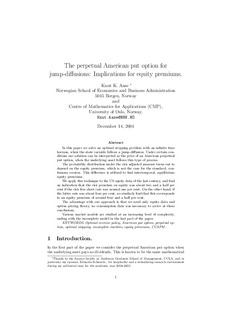The perpetual American put option for jump-diffusions : implications for equity premiums
Working paper
Permanent lenke
http://hdl.handle.net/11250/163725Utgivelsesdato
2004-12Metadata
Vis full innførselSamlinger
- Discussion papers (FOR) [566]
Sammendrag
In this paper we solve an optimal stopping problem with an infinite time horizon, when the state variable follows a jump-diffusion. Under certain conditions our solution can be interpreted as the price of an American perpetual put option, when the underlying asset follows this type of process.
The probability distribution under the risk adjusted measure turns out to depend on the equity premium, which is not the case for the standard, continuous version. This difference is utilized to find intertemporal, equilibrium equity premiums.
We apply this technique to the US equity data of the last century, and find an indication that the risk premium on equity was about two and a half per cent if the risk free short rate was around one per cent. On the other hand, if the latter rate was about four per cent, we similarly find that this corresponds to an equity premium of around four and a half per cent.
The advantage with our approach is that we need only equity data and option pricing theory, no consumption data was necessary to arrive at these conclusions.
Various market models are studied at an increasing level of complexity, ending with the incomplete model in the last part of the paper.
Utgiver
Norwegian School of Economics and Business Administration. Department of Finance and Management ScienceSerie
Discussion paper2004:19
